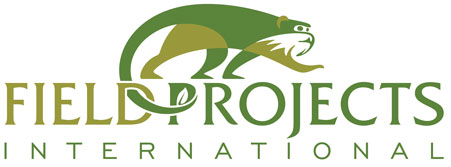Wildlife Health

Participate: Wildlife Capture - Sample - Release
Applications for the 2025 field season are CLOSED
Stay tuned for 2026!
Quick Facts
- Start Dates: May 25th, June 15th, July 6th
- Minimum Commitment: 5 weeks (in special cases we will consider fewer)
- Location: Los Amigos Biological Station, Peru
- Application Deadline: April 14 OR until remaining spaces are filled
- Program Fee: $2,450 for 5 weeks; $490 each additional week (Fee includes food and lodging at the field station, training and use of field equipment. Fee does not include transportation to field station).
- More information in the FAQ below the program description.
PROGRAM DETAILS
Annually since 2009 we have conducted a non-human primate mark-and-recapture program at Los Amigos Biological Station during which we have recorded individual survival, health status, and collected basic, non-harmful biological samples for a variety of purposes. research. In 2018, this program was expanded to the entire Neotropical vertebrate community (including bats, birds, small terrestrial mammals, medium and large mammals, and herpetofauna) with the aim of improving molecular reference data for the region and studying ecological links throughout the community.
In 2025, we will continue this large-scale research program that has become an in-depth training opportunity for many students and young professionals interested or involved in veterinary care, conservation and wildlife ecological research.
Our program is not only unique in the wide variety of taxonomic targets being studied and sampled simultaneously, but also in our ability to perform on-site sample analysis in conjunction with the In Situ Laboratory initiative, which was founded here.
The Madre de Dios (MDD) region of Peru is part of the Tropical Andes Biodiversity Hotspot, which includes the Andes Mountains and adjacent lowlands of Ecuador, Colombia, Peru, Venezuela and Bolivia, and some parts of the north from Argentina and Chile. Within the hotspot, the MDD has been designated by law as the “biodiversity capital” of Peru, with more than 50% protected either in a private conservation concession or as a regional protected area. A 2018 MDD assessment revealed the following statistics: 6,809 plant species, 1,212 bird species, 272 fish species, 256 mammal species, 183 amphibian species, and 143 reptile species. The indigenous groups living in this region certainly have valuable knowledge about these species, and probably more that are new to science, but even among those documented by scientists, there is still much to learn. The Los Amigos Conservation Center where this study is conducted is located within the Los Amigos Conservation Concession, established in 2000.
A very small proportion of these animals have their DNA sequenced, with records stored in global biodiversity databases. Even fewer have complete genomes assembled. The main reasons for this are a) a disparity in the rate of development of sequencing technologies and the accessibility of these technologies globally: as one end of the spectrum moves forward, it leaves several others behind; b) high costs to carry out genomic studies; c) the difficulty of acquiring biological samples from so many animal species and d), the need to export specimens outside the MDD region for analysis.
All this is about to change, and necessarily, for two reasons:
- Biodiversity loss is at a critical level in the region. A recent study found that between 1993 and 2013, forest cover converted to agricultural land by 470%, mining areas by 938%, and urban areas expanded to agricultural land by 187%. This was inspired in part by the slow economic development of the MDD region, which spurred several programs to encourage infrastructure construction and job development. In 2010, for example, the Interoceanic Highway connecting the Pacific ports of Peru to Brazil was completed, which has encouraged immigration, economic development, and the growth of many secondary roads. Unfortunately, as in many places around the world, the balance between development and conservation is delicate and difficult to maintain.
- Sequencing just got smaller, more efficient and less expensive with the arrival of portable nanopore sequencers produced by Oxford Nanopore Technologies. Along with dozens of other kits now having slimmer, easier-to-use versions on the market, field genomics is quickly approaching a reality rather than a dream.
Long-term data on animal pathogens and parasites, as well as their health, are indicators of population and community well-being. Removals of animals from the wild, or changes in habitat or climate, can be reflected in metrics such as parasite/pathogen richness (unique number of species) or diversity (uniformity of species distributions), and parameters such as the weight of the animals or complete blood counts. Along with our mark-recapture research programs, we have been safely collecting a variety of sample types for microscopic and molecular laboratory analysis to monitor wildlife disease and health since 2012 (see our page of publications). These past efforts have never seemed more important than they are today, as the world works to overcome a global pandemic. Only through long-term sampling programs will we be able to address issues such as:
- Is parasite species diversity changing and at what rate?
- To what extent are pathogens/parasites shared among multiple host species (e.g., in addition to bats, do monkeys, rodents, or marsupials harbor a natural coronavirus infection)?
- What parasites/pathogens affect animal health?
- What human diseases pose a risk to wildlife and vice versa?
All of our research methods have been carefully practiced and perfected by our experienced scientists and several wildlife veterinarians with whom we collaborate. Sampling protocols are comprehensive but put the animals’ comfort and safety before our own. For example, to ensure maximum safety of the animals, we carry out all processing in the jungle, at the control site. We limit the number of animals we examine each day. We start each day very early, setting up our processing tents before dawn and closing them at an appropriate time to ensure that no animal is held overnight or all day, depending on whether the animal is nocturnal or diurnal. Therefore, we cause the least possible disruption in their lives. Samples from this program are analyzed on site and at partner laboratories in the US and Peru using microscopy and molecular techniques. Participants will be able to receive further on-site training in field molecular genetics.
The Amazon Conservation Association, the Animal Care Committee of Washington University in St. Louis, and the Ministry of Agriculture and Forestry of Peru sanction high biosafety standards and animal handling and sampling protocols.
Training and skills
By the end of this program, you will have acquired a number of skills essential to the study of wildlife sampling, sample storage and organization, and morphological and health characterization.
- Field sampling for environmental DNA detection programs.
- GPS navigation training for off-road navigation.
- Sample biobank under field conditions.
- Identification of species through morphometry.
- Coordination of samples during field anesthesia of medium-sized mammals by veterinarians.
- Best practices for personal safety and well-being during field work in forest systems
- Non-invasive sample collection
- Animal tracking and safe capture and release techniques.
- Safe animal handling procedure focused on bats, small mammals and birds, including a number of opportunities to directly participate in collection events.
- Sample collection, handling, labeling, and storage protocols, including the use of sterile techniques to avoid self-contamination and preserve sample integrity.
- Collection and management of animal health data.
We are very proud to be able to provide high-quality research and training experiences to a diverse student body. The following list is not exhaustive and is intended to give an idea of the background of participants who have found great value in this program.
- One Health professionals or trainees.
- Veterinarians, pre-veterinary students, veterinary technicians.
- Students and public health professionals.
- People interested in ecological research.
- Those with a strong interest in biodiversity conservation and conservation genomics.
- Lovers of Latin names and taxonomic identification
- Those with prior laboratory skills eager to transpose these to a cutting-edge field laboratory.
We are currently recruiting participants with the following qualities. If you are uncertain if you are eligible don’t rule out the program, please contact us to confirm.
Minimum Requirements:
- You must be at least 18 years of age by the time the training program begins (no upper age-limit)
- A letter of recommendation from a source that can substantiate the participant’s experience and skills
- Must be able to carry at least a 20 lb back pack during field expeditions
- Fluency in basic spreadsheet management via Excel.
- A vaccine to COVID-19 (see FAQ below for details)
- Participants must be in good physical condition, with the capability to walk 4 miles a day
Preferred Requirements:
- Ideal participants will be biology majors, have taken anatomy- and morphology-based courses, and/or demonstrate a strong interest in natural history.
- Genomics experience is not required, you will gain this on this program, but prior laboratory experience is welcomed.
- Participants will not be discriminated against for medical conditions they might have; we must determine that being on this project will not pose an immediate risk to their health
- Participants must be willing to maintain long hours in the field and the laboratory, with every effort made to balance this across the program.
- Participants must be reliable – when a team is assigned to work with a group of animals, days of planning go into the execution of the protocol. Carelessness and tardiness on the part of the participant could jeopardize the entire project.
- Participants must be detail-oriented; our job is to track species across several capture programs
- Due to the nature of the work and weather constraints, participants MUST be willing to be flexible about their schedules
Principal Investigators
Dr. Mrinalini Watsa initiated the program in 2009 during her doctorate with a primary interest in studying genetic chimerism and reproductive biology.
Dr. Gideon Erkenswick formally joined the effort in 2012 and added a research angle on parasite ecology.
Dr. Caroline Moore joined the disease and health research team in 2021 to document Hg bioaccumulation in concert with parasite and pathogen infections status.
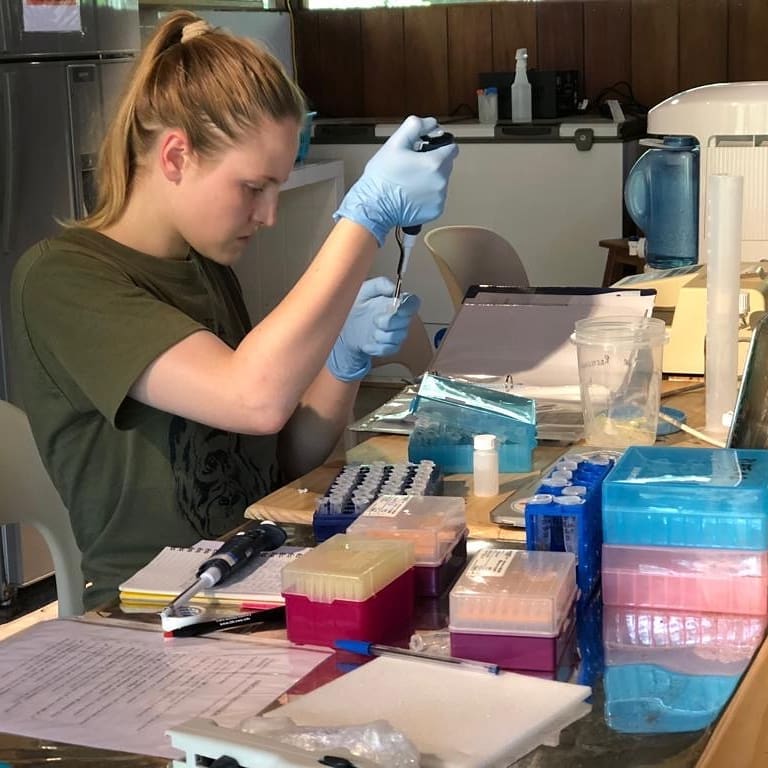
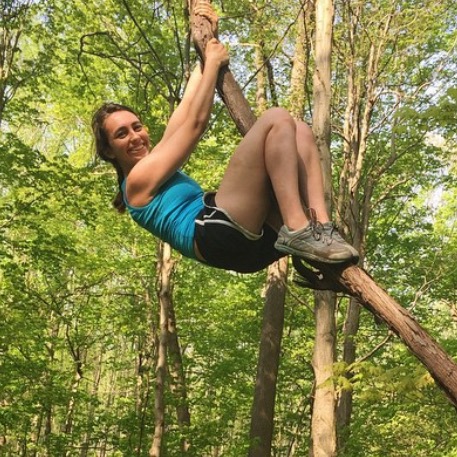
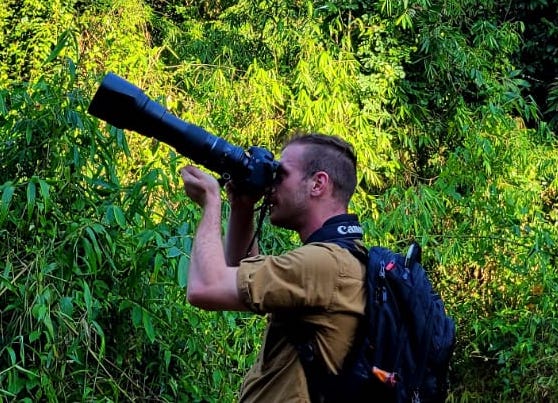
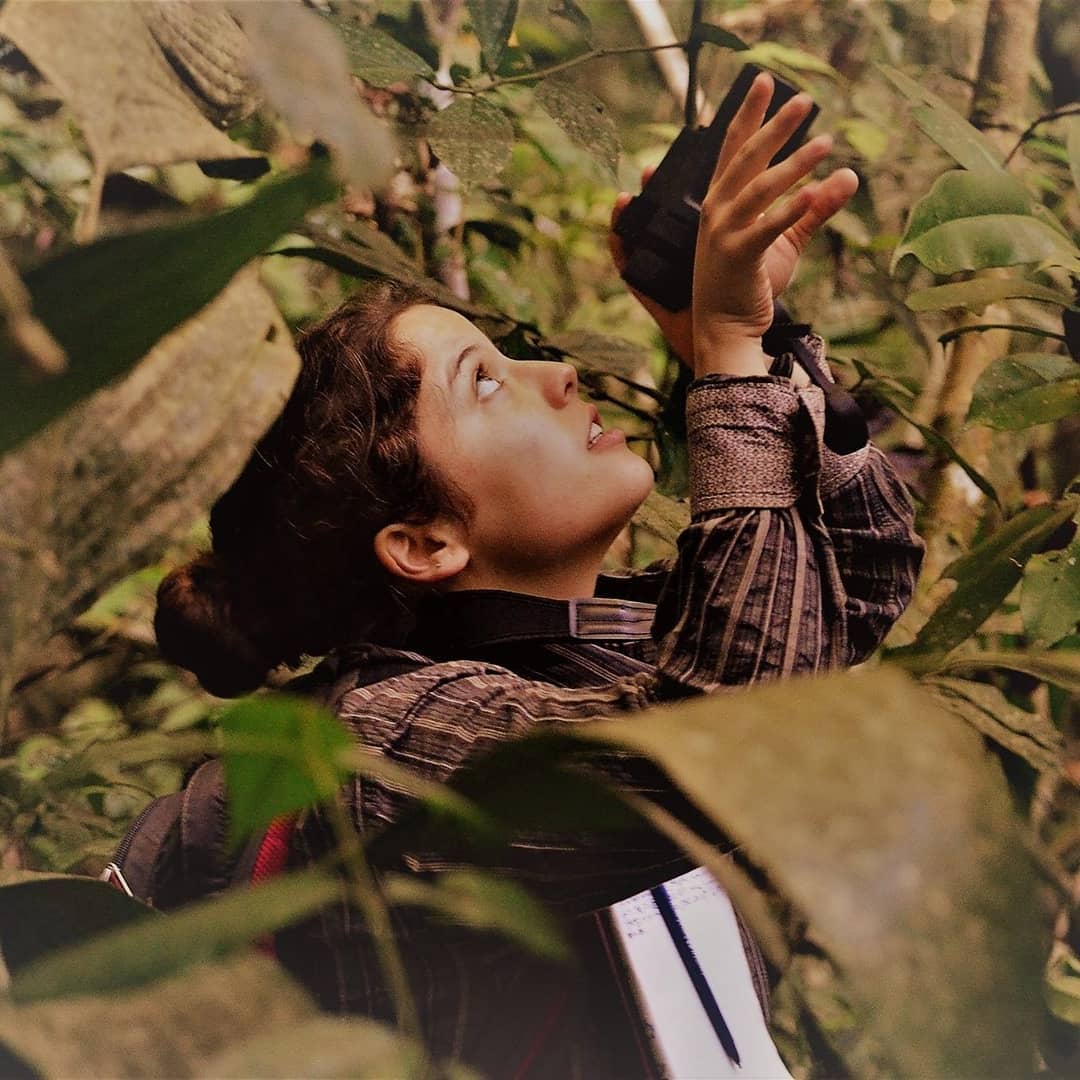
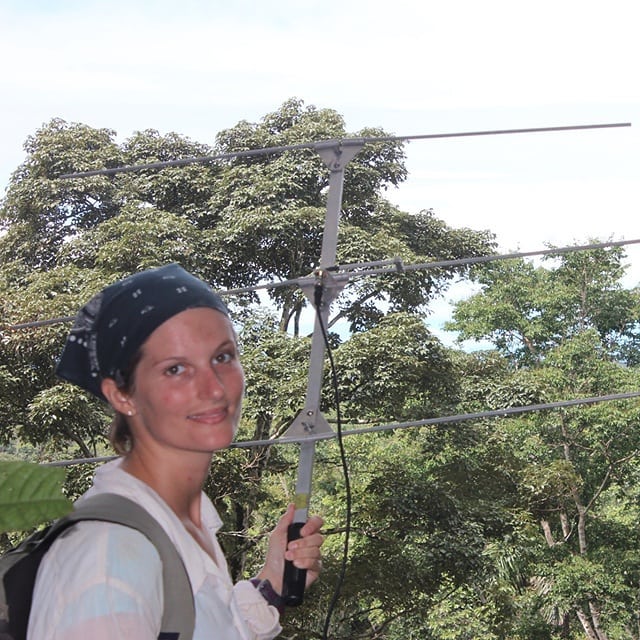
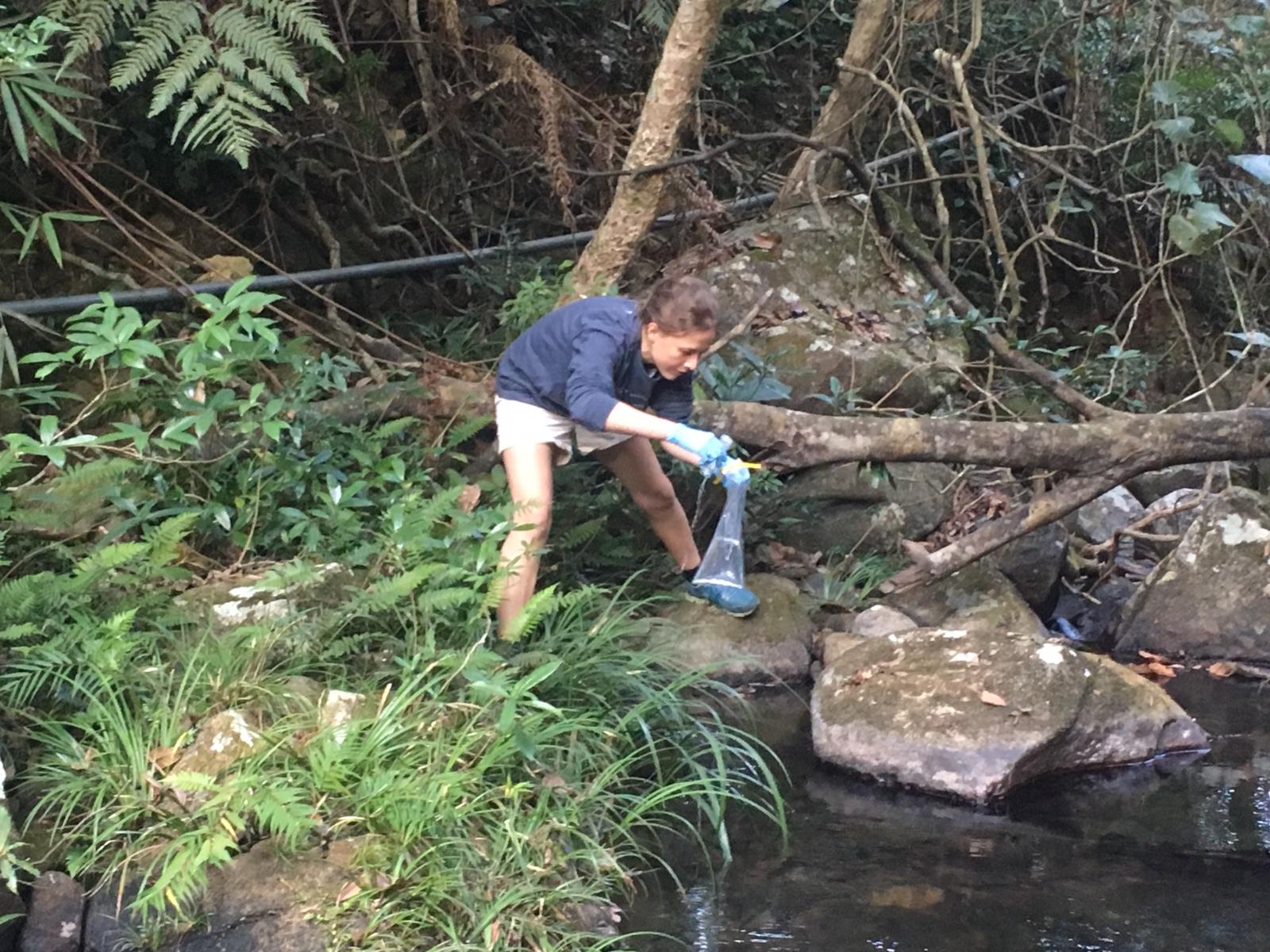
Frequently Asked Questions
1. Apply online here. You will need a CV/resume and two references.
2. Once we hear from your references, we will schedule an interview with the principal investigator of your desired project
3. If accepted, you will be notified within 1 week
4. Upon acceptance, gain student access to online training modules to get prepared before you arrive.
5. Turn in medical info, vaccination record, liability waivers, etc.
6. See you in the field!
If FPI cancels a program due to complications related to COVID-19, participants would receive all but 1.5% of fees already paid. The 1.5% represents the credit processing fees charged to FPI for accepting online payments.
Our cancellation policy is:
- 30 days or more before your start date: 45% of the program final fee refunded. Please note that the down payment is not refundable.
- Less than 30 days from your start date: no refund is possible
Yes, but it would have to be approved by your university, who will also bill you for the credit hours. If approved, there is also an additional $250 fee that serves as a mentorship fee for the FPI senior scientist mentoring you through this project. From there, it is just a matter of coordinating between your university mentor and the FPI researcher.
In order to train our research teams, it is necessary that everyone arrives on specific start dates and be trained together to stay on pace with their cohort.
In addition, we arrange to meet arriving groups and escort them to pick up any last-minute supplies before leaving very early the following morning to the field station. Getting to the field station requires travel overland to a small town called Laberinto (~45 minutes), then a 5-6 hour boat ride upriver. All of this would be difficult for most participants to do alone, which is why we ask that you arrive on fixed program start dates.
If you REALLY cannot make a particular start date, don’t abandon hope – email us and we can do our best to accommodate you.
There are pretty firm minimum requirements for each long-term research training program (typically 5 weeks). These are firm because each participant must be trained, during which time the data they collect cannot be relied upon entirely.
On the other hand, for most programs you are welcome to apply for stays that are longer than the minimum period, which is common among our student researchers. This can be arranged beforehand, or even sometimes in the field if accommodation is available at the field station.
If you have a special circumstance and want to request a shorter program time, you may contact us and we will discuss it with the lead investigators on your chosen project. There is no guarantee, but in the past we have been able to accommodate on occasion.
Our courses have fewer enrollment requirements, and we strongly encourage anyone to apply. The long-term programs involve becoming an integral part of a research team, and thus are more competitive.
You absolutely can apply to both a field course and a long-term training program if the dates will line up! In fact, if you are accepted into the long-term program you can attend a field course for a lower fee (typically a $400 discount)
No, you do not need previous research experience. These are training programs designed for participants at all levels. It can be hard to acquire field experience, so we balance our teams with veteran researchers and those new to the world of field research. We seek bright and enthusiastic candidates with the right temperament to work in this challenging environment.
The cost to participate includes:
- Lodging and all meals at the field station
- Specialized equipment and supplies necessary to conduct training and research activities.
Program fees do NOT include:
- Transportation to the field station from Puerto Maldonado
- staff will meet with you in Puerto Maldonado and guide you to the field station, but you will cover this cost (around $30) on your own
- Lodging and meals in Puerto Maldonado
- Health or travel insurance
- Required vaccinations
- Binoculars or other personal field equipment
A large majority of the fees paid to our training programs cover lodging fees charged by the host field station. Importantly, at the Los Amigos Biological Station lodging fees not only support the cost of running and maintaining a remote field site, but contribute to the larger mission of their parent NGO (Association for the Conservation of the Amazon Basin) to protect conservation areas, monitor deforestation, maintain wildlife corridors, and more.
Peer-to-Peer Fundraising
We are now able to offer a peer-to-peer fundraising program for research assistants. Once accepted, you would be able to (optionally) create a shareable profile on our platform. This is a team-based initiative, so half of your raised funds will go toward your own program fees, while the other half will go into pool to be split evenly among all program participants who had at least 5 donors. More details will be available during (and after) your interview.
Scholarships
We offer three scholarships to our programs & courses in field biology and conservation.
All Scholarships Cover:
- Meals and lodging at the field station
- Basic equipment required to attend the course (not including binocular/boots)
Scholarships Do Not Cover (unless specifically noted):
- Transportation to the local contact point.
- Binoculars, boots, basic medications, backpacks, or other personal items
- Vaccinations and medical insurance. All participants must provide proof of medical insurance before travel.
*Ensure you meet the qualifications for the scholarship you are applying for before submitting an application.
Other Options
If you require help with the cost of the program, there are other options that you might pursue as well. You could start by contacting the Office of Undergraduate Research of your school, or request professional development support from your employer. Here you can explore what is available through your college/place-of-work, as well as through external funding sources. Many universities have SURF (Summer Undergraduate Research Fellowship) programs, which may provide stipends for students to pursue independent research. Please note that if you do find any kind of research-related funding — as many RAs have in the past — it will need to be applied for in conjunction with us, on research projects that we approve. In this case, one of our principal investigators will consult with you about developing a project that is feasible.
All participants are required to show proof of medical insurance before joining us in the field. Many travel insurance providers can assist with emergency medical coverage and emergency medical evacuation. Be certain that COVID-19 is covered in your plan.
You will have to provide proof of a normal vaccination record (as listed here by the CDC). For travel to Peru, we require that you also get the following vaccines:
- Typhoid
- Yellow Fever
- Tetanus
- COVID-19 (no exceptions)
- Rabies pre-exposure series (only for those in programs involving wildlife handling of mammals.)
If you have the flu shot for the year, all the better. Find a travel clinic and get your shots EARLY.
A fully independent research project is not feasible in this program due to time constraints, as well as the fact that all research projects must be sanctioned by the field station, approved by an IRB/IACUC, and have the required permits from the relevant government agencies in Peru. All of our research projects have obtained the necessary approvals and permits, which cover the specific data we collect and how we use it.
That said, some candidates may have an opportunity to win a grant that will fund their program fees and travel, and that grant requires them to submit a research proposal. If this is your situation, we may be able to work with you on a proposal. You can contact us at info@fieldprojects.org and let us know your situation. Then after you officially apply to the program, you can discuss this in greater depth with one of our senior scientists.
We cannot accommodate completely independent projects, but we can assist you with finding a subset of our samples or data that has not yet been fully analyzed, which you could potentially develop further under our supervision.
Yes, you can. We do not give co-authorship for collecting data alone, but we offer interested students the opportunity to work on data analyses after the summer research program, that could lead to co-authorship in the future. Many of our former field team members have gone on to become research collaborators.
Our programs will proceed as planned unless global travel restrictions prevent our team from reaching the field site, or the field site is shut down.
In the event of an ongoing pandemic quarantine and testing protocols will be observed to ensure that no one exposes another team member or animal the infectious agent. In addition to our programs protocols, all persons will have to comply with national travel regulations. During COVID-19, out field station qualified as a quaruntine site, since it met all government-approved COVID protocols, and has the capacity to maintain social distance between all visitors.
Our enhanced protocols in laboratory and wildlife handling situations are designed to meet or exceed scientific best practices. They are drafted in conjunction with our Peruvian partners (Conservacion Amazonica), Peruvian authorities (SERFOR) and Institutional Animal Care and Use Committees (IACUC) of our affiliate research universities. Broadly speaking, they will involve strict use of face masks, N95 masks, and gloves during specific activities.
Participants will receive detailed instructions on our procedures prior to departing for the field site.
The first signs of suspected symptoms or a temperature above 100 degrees Fahrenheit should be reported immediately to the field station managers and FPI senior scientists. They will have protocols for isolating symptomatic guests, arranging viral testing, notifying those you have been in contact with, and evacuating you to the nearest hospital if necessary.
(Note that travel to a hospital and any care there is at your own cost; make sure your insurance policy covers this.)
The nearest healthcare facilities are in Puerto Maldonado, which is approximately 4-5 hours downriver from our field site. In that city, our Peruvian partners have a recommended doctor certified by MINSA (the Ministry go Health). There are also other private and public healthcare options. The private facilities are more expensive (one of the reasons we require participants to have travel medical insurance), but they will likely be able to treat patients faster if public facilities are full.
The second option would be in Cusco, which is approximately 10 hours by car from Puerto Maldonado. There are more clinics in Cusco than Puerto Maldonado.
*While everyone will have their temperatures taken upon arrival by an infrared thermometer, we suggest that participants bring their own thermometers in their first-aid kits, and check themselves daily.
If a person must leave the field station to get treatment and recover from COVID-19, they will be permitted to return after 7 days with a negative antigen test. A negative molecular test will let someone back to the station after 14 days.
Location: 443 Old Via Rancho, Escondido CA 92029
Phone: +1 (314) 649-8636

